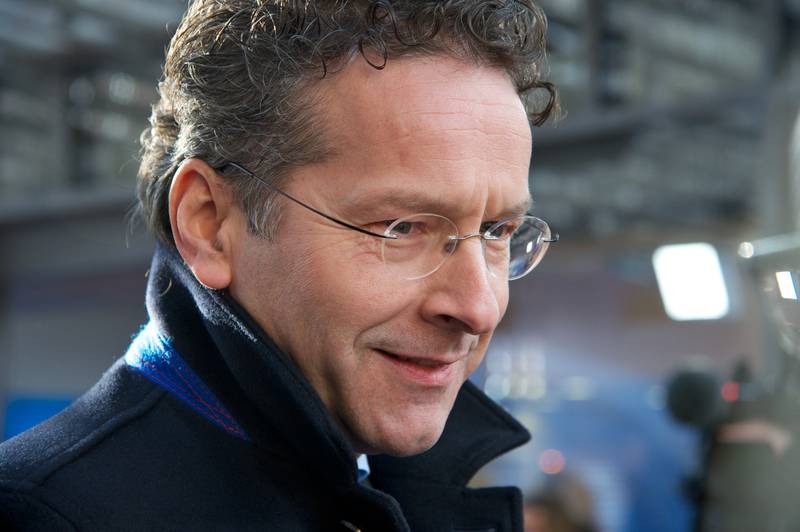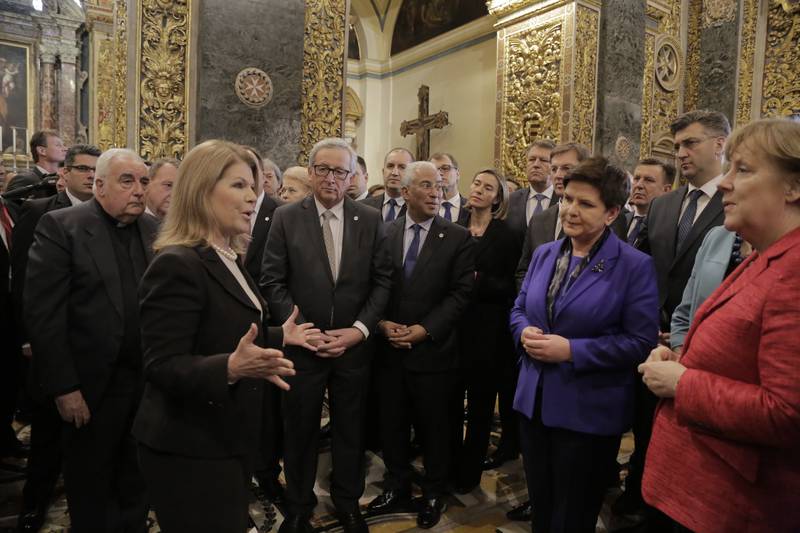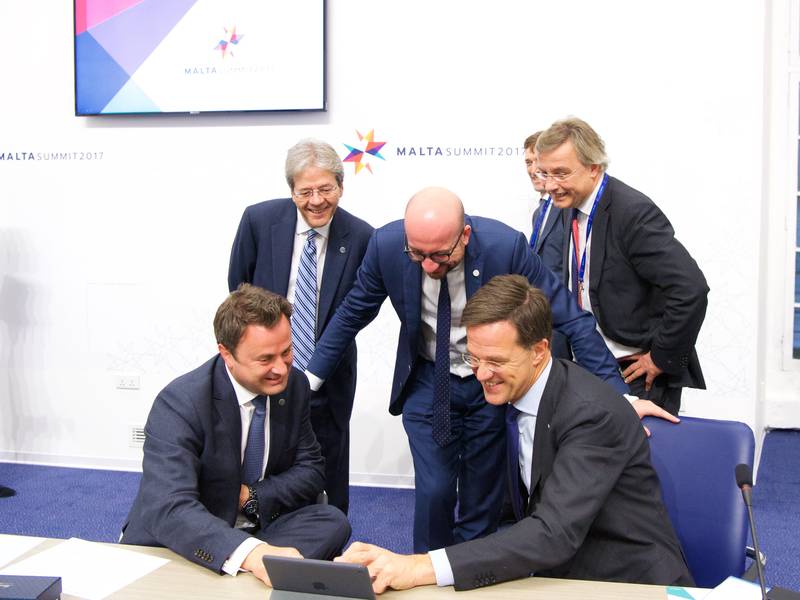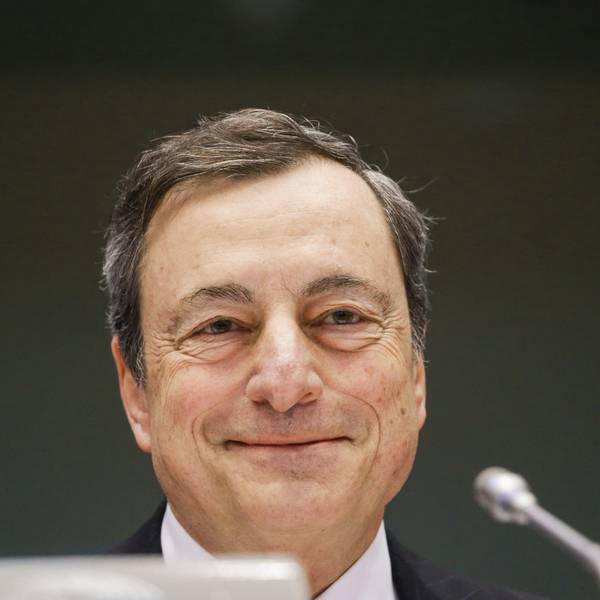The Battle for the EU - Liberalism vs. Illiberalism
Adelina Marini, February 10, 2017
 It is again a crisis that drives the European Union towards a reconsideration of its state and towards change, as it has always been throughout its 60-year long life. Last year saw just the beginning of talks about the Union’s future after the Brits’ decision to leave it and the election of Donald Trump for US President acted as a catalyst on the debate, which is supposed to crystallise into an agreement about the future at the end of march on the occasion of the 60th anniversary of the signing of the Treaty of Rome, which laid the foundations of the EU. Talks about the future began in September of last year in the Slovak capital Bratislava. There is not much time left until end-March and specific ideas are more reactive, rather than creative. Reactive towards the main challenges faced by the EU – the radical geopolitical change and the domestic political battle with populists.
It is again a crisis that drives the European Union towards a reconsideration of its state and towards change, as it has always been throughout its 60-year long life. Last year saw just the beginning of talks about the Union’s future after the Brits’ decision to leave it and the election of Donald Trump for US President acted as a catalyst on the debate, which is supposed to crystallise into an agreement about the future at the end of march on the occasion of the 60th anniversary of the signing of the Treaty of Rome, which laid the foundations of the EU. Talks about the future began in September of last year in the Slovak capital Bratislava. There is not much time left until end-March and specific ideas are more reactive, rather than creative. Reactive towards the main challenges faced by the EU – the radical geopolitical change and the domestic political battle with populists.
At the informal EU summit in Malta on February 3 a “great degree” of convergence of opinions was announced that the EU should use opportunities, which open and close, as well as about the role, which the EU should play on a global arena following the inauguration of the new US President Donald Trump. How big is this degree of convergence and how long is it going to last is a very important question, keeping in mind that there are elections coming this spring in key EU countries – France and The Netherlands – and one should not forget that Hungarian Prime Minister Viktor Orbán openly supports Donald Trump, thus undermining European unity.
An end must be put to the synergy between geopolitics and domestic politics
Over the last few weeks activity in certain politicians, member states, or groups of countries has increased significantly. Iconic example for this was the speech of the leader of the Eurogroup, Jeroen Dijsselbloem (The Netherlands, Socialists and Democrats), whose position currently hangs entirely on the result of elections in The Netherlands this spring. The many questions pointed at him about whether he will keep his post, as well as the support of his colleagues from the Eurogroup are probably the inspiration of his January 24 speech about the future of Europe, because its first part is entirely dedicated on the elections in various parts of the EU this year.
He expressed conviction that the next Dutch government will again be a coalition of centrist or moderate parties. There is also doubt that in Germany the populist Alternative for Germany party will be a part of any coalition. Dijsselbloem was optimistic regarding France as well. “My best guess is that at the end of this year Germany, France and the Netherlands will still be governed by mainstream, sensible politicians. Then will also be a good moment to push ahead on a number of topics regarding the future of the EU and the Eurozone”, he said.
The Dutch finance minister admitted that even if his optimistic forecast comes true, this by no means hails the end of populism. “I think it is here to stay, nourishing discontent and blaming the outside world. But we mustn't forget that the vast majority of our population still places its trust in moderate parties, left or right. These mainstream parties will have to regain trust. The trust of their people that they will provide security and economic perspectives”, is Jeroen Dijsselbloem’s recipe. He believes the new Trump administration to be one more reason (besides the Brexit) for rethinking the EU’s position. “Geopolitical issues, defence and security, tax issues, the future of international financial institutions, and off course trade are now surrounded by question- and exclamation marks. Trump challenges Europe in many ways”.
Trump appears as a second focal point of anti-European politics besides Russia with statements, which caused waves of concern in member states, which have so far been living with no worries under the United States geopolitical wing. Now, however, the world is being divided up into remnants of the current reality and the alternative reality, created by Putin and Trump’s propaganda machines, each with his own goals. Their efforts find fertile ground in more and more political formations within the EU, which feel empowered to continue with the erosion of the Union until they gain full disintegration.
 Prior to the Malta summit the president of the European Council, Donald Tusk, who left the summit with a new nickname – “our Donald” – described three threats faced by the EU, pointing out that the current EU challenges are “more dangerous than ever before in the time since the signature of the Treaty of Rome”. The first threat is the geopolitical situation. “For the first time in our history, in an increasingly multi-polar external world, so many are becoming openly anti-European, or Eurosceptic at best. Particularly the change in Washington puts the European Union in a difficult situation; with the new administration seeming to put into question the last 70 years of American foreign policy".
Prior to the Malta summit the president of the European Council, Donald Tusk, who left the summit with a new nickname – “our Donald” – described three threats faced by the EU, pointing out that the current EU challenges are “more dangerous than ever before in the time since the signature of the Treaty of Rome”. The first threat is the geopolitical situation. “For the first time in our history, in an increasingly multi-polar external world, so many are becoming openly anti-European, or Eurosceptic at best. Particularly the change in Washington puts the European Union in a difficult situation; with the new administration seeming to put into question the last 70 years of American foreign policy".
The second threat, outlined by our Donald, is internal and it is linked to the anti-European, nationalistic, and the growingly xenophobic feelings within the EU itself. “National egoism is also becoming an attractive alternative to integration. In addition, centrifugal tendencies feed on mistakes made by those, for whom ideology and institutions have become more important than the interests and emotions of the people”. This remark has a very clear address – traditional parties and the pro-European forces, which in the eyes of our Donald have gone too far in pulling on the bowstring.
The third threat according to Donald Tusk is the mentality of pro-European elites. “A decline of faith in political integration, submission to populist arguments as well as doubt in the fundamental values of liberal democracy are all increasingly visible”, writes Donald Tusk to leaders with a call to “have the courage to oppose the rhetoric of demagogues”. Tusk warned that the disintegration of the EU would not lead to the reinstatement of “some mythical, full sovereignty of its member states”, but to real dependence on the great superpowers: The USA, Russia, and China. “Only together can we be fully independent”, believes the former prime minister of Poland, who hopes to get re-elected for a second term to the post of leader to the European Council.
Together, but in two speeds
The big surprise at the Malta summit came from German Chancellor Angela Merkel, who until recently had been the unchallenged favourite to win a fourth consecutive term as Germany’s Chancellor, but now has some stiff competition in her strongly pro-European competitor in the left wing – Martin Schulz. The man, who until recently was boss of the European Parliament and managed to exalt the institution to the highest level of European politics and the decision-making process, seems to be an entirely acceptable competition for Mrs Merkel. Polls are already giving him advantage over the conservatives of Mrs Merkel, who was announced by large international media and analysts as the sole keeper of liberal order in Europe.
According to Angela Merkel, the time has now come for a multi-speed EU "in which not all member states are always at the same level of integration". The idea of a multi-speed Union is not new by far and has long been fact, but the comment is symbolic for it shows that even Mrs Merkel has matured for the changes, which are being forced in the EU both from the outside and the inside. The statement of the German chancellor was not welcomed by everyone. Finland Prime Minister Juha Sipilä stated that a two-speed Union, in which some members will be moving faster towards integration than others, is not an answer. “We must strengthen our commitments to the EU’s common values and must find a way to proceed together at the same pace”, he said at the end of the one-day summit in Malta.
 Support for a two-speed Europe were also cast by Belgium, The Netherlands, and Luxembourg, who came out with a joint statement after Malta. In it they state that the EU is more than the sum of its members and it needs to continue developing with its supranational structures and community method. The prime ministers of the three countries demand that the EU Treaties continue to be the foundation of future cooperation, which means enhancement of the four freedoms, common market, the social dimension, and a strong euro area. They want a Union, in which there is respect for human dignity, freedom, democracy, equality, and rule of law and human rights.
Support for a two-speed Europe were also cast by Belgium, The Netherlands, and Luxembourg, who came out with a joint statement after Malta. In it they state that the EU is more than the sum of its members and it needs to continue developing with its supranational structures and community method. The prime ministers of the three countries demand that the EU Treaties continue to be the foundation of future cooperation, which means enhancement of the four freedoms, common market, the social dimension, and a strong euro area. They want a Union, in which there is respect for human dignity, freedom, democracy, equality, and rule of law and human rights.
In their declaration the three states stress on the need to reinstate trust in the EU, which could be accomplished through fulfilling negotiated agreements and by making the decision-making process more transparent and democratic. To them it is of special importance that European law is being enforced in full, regarding rule of law in member states, because it “is critical to the internal market, the Schengen area and further development of the EU”. “Different paths of integration and enhanced cooperation could provide for effective responses to challenges that affect member states in different ways”, believe Belgium, The Netherlands, and Luxembourg.
Opposed to such an idea was the leader of Poland’s ruling Law and Justice Party Jarosław Kaczyński, regarded as the informal leader of Poland. He believes that a two-speed Europe will lead to a breakdown and the practical liquidation of the EU. At the same time, however, Poland is one of the states putting a brake to Union integration. Ever since the new government came to power, almost all legislative initiatives are being blocked, which provide for more integration, like the setting up of an European prosecution, which would fight against European funds’ fraud.
Europe of nations, or an European nation? No, Europe of values
Jarosław Kaczyński advocates for a looser Union, in which member states have control over all the power. Of the same opinion is Hungarian Prime Minister Viktor Orbán, who believes the EU wields way too much power, which needs to be returned to member states. This was the very subject of his regular summer speech in Romania. The same idea is supported by the French presidential candidate Marine Le Pen, whose group in the European Parliament is called exactly Europe of Nations and Freedom. The first commitment in her election agenda is holding a referendum on leaving the euro area and the EU.
The other political current in the EU supports a deepening of integration and especially in the euro area. This is the feeling of southern member states, who met in end-January at a special summit in Lisbon. The leaders of Cyprus, France, Greece, Italy, Malta, Portugal, and Spain believe that a weakening of Europe is not an option. To them the solution lies in deepening the currency union. The prime ministers of the seven countries expect “clear proposals” for the completion of the euro area and closing of the economic divergences and asymmetries in the currency club. They also place an accent on the necessity that the EU upholds its values of freedom, democracy, rule of law, and respect and protection of human rights.
If it comes to a two-speed EU it would mean isolation of states outside the euro area, as euinside has forecasted on numerous occasions. This is also the most logical step, for integration is deepest in the Economic and Monetary Union. In times of rapid disintegration of the current world order, however, that was based on the spreading of liberal democracy and open trade, the EU is not so much facing the choice of more or less Europe, but rather what Europe. It becomes clear from official and unofficial statements made so far that the EU will split by the values line – to a liberal and illiberal part. The latter is an obstacle for the development of the former. So it may turn out that after Rome the EU will take the shape of a rocket that disengages from its first, illiberal stage. Or rather from the states it does not trust.
 It is exactly trust that the leader of the European Central Bank Mario Draghi talked about in Slovenia last week. He stated that the recipe for the survival of the EU in today’s tumultuous world is following the rules. “What is preventing us from moving ahead today is, in part, the legacy of those past failures, which creates a lack of trust among countries to enter into such a new stage of integration.Trust that all countries will comply with the rules that they have set for themselves, so as to reduce their mutual vulnerability. And trust that all will enact the necessary reforms to ensure structural convergence, so that complying with those rules becomes easier, and sharing risks does not create permanent transfers between countries. Compliance and convergence, and through it growth, are the keys today to give to the integration process new impetus.”
It is exactly trust that the leader of the European Central Bank Mario Draghi talked about in Slovenia last week. He stated that the recipe for the survival of the EU in today’s tumultuous world is following the rules. “What is preventing us from moving ahead today is, in part, the legacy of those past failures, which creates a lack of trust among countries to enter into such a new stage of integration.Trust that all countries will comply with the rules that they have set for themselves, so as to reduce their mutual vulnerability. And trust that all will enact the necessary reforms to ensure structural convergence, so that complying with those rules becomes easier, and sharing risks does not create permanent transfers between countries. Compliance and convergence, and through it growth, are the keys today to give to the integration process new impetus.”
From everything said so far the conclusion is drawn that in Rome a reckoning of trust will be done – who trusts/distrusts whom, and the decision where to and how to continue will be secondary. There is less than a month left to the anniversary.
Translated by Stanimir Stoev
 Federica Mogherini | © Council of the EU
Federica Mogherini | © Council of the EU | © Council of the EU
| © Council of the EU Luis De Guindos | © Council of the EU
Luis De Guindos | © Council of the EU